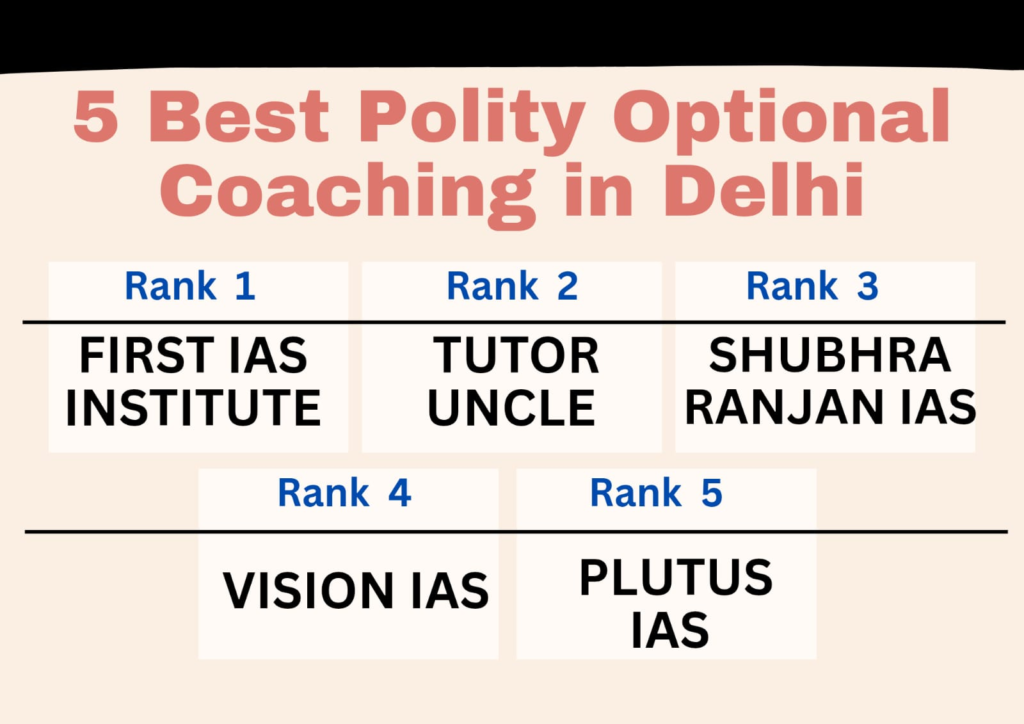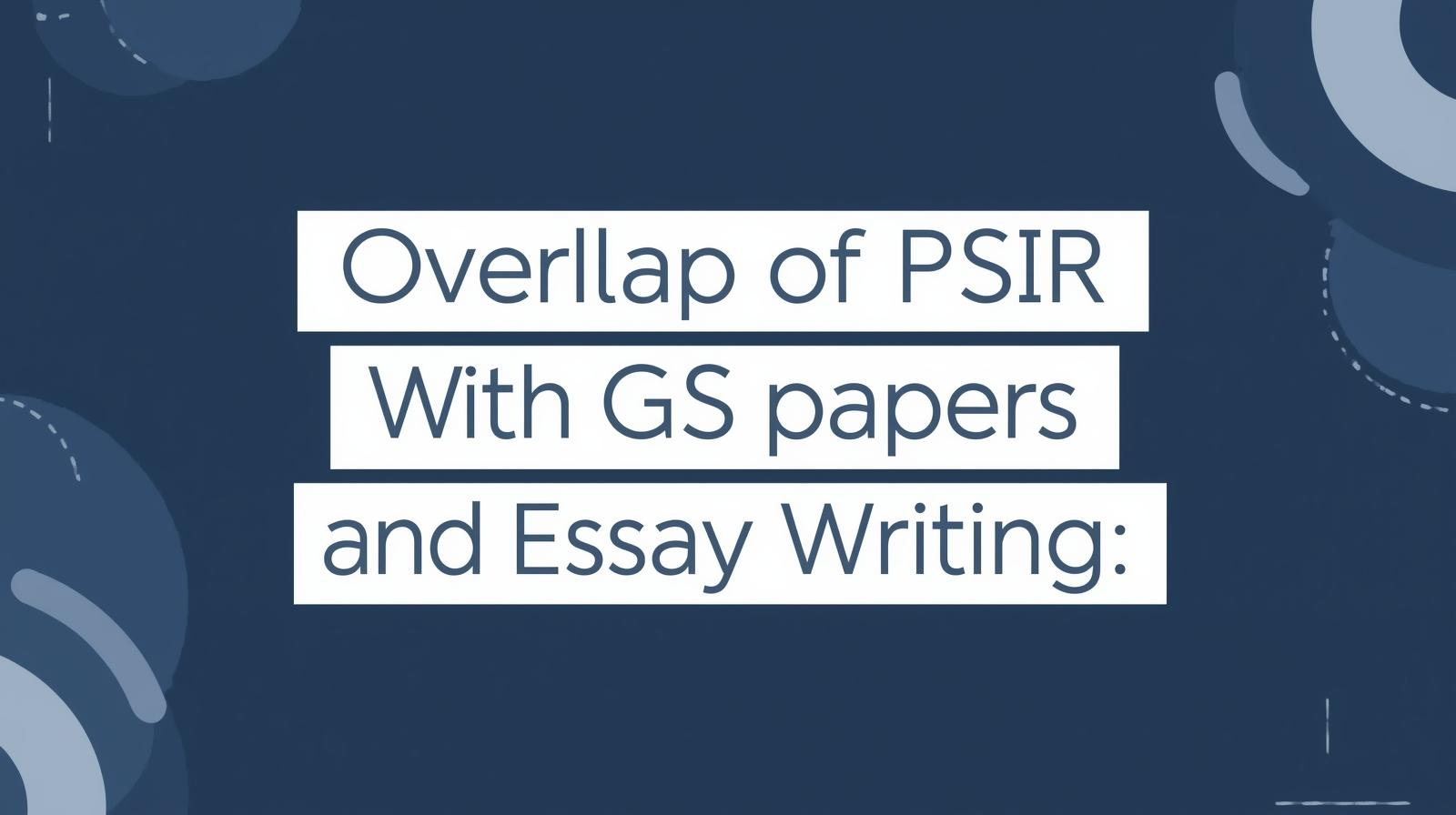Political Science and International Relations (PSIR) has the most extensive and direct overlap with the General Studies (GS) syllabus of any optional subject. It almost entirely covers the Polity and International Relations sections of GS Paper 2, provides foundational concepts for GS Paper 4 (Ethics), offers historical context for GS Paper 1, and equips candidates with the analytical frameworks and content needed to write high-scoring essays. This synergy makes an integrated preparation not just possible, but essential for efficiency and success.
When choosing an optional subject for the UPSC Civil Services Examination, one of the most critical strategic considerations is its synergy with the General Studies papers. An optional that exists in an isolated silo demands a separate, dedicated stream of effort. An optional that overlaps, however, creates a virtuous cycle where preparation for one reinforces and deepens the understanding of the other. In this regard, Political Science and International Relations (PSIR) stands out as arguably the most synergistic optional available.
This article provides a comprehensive deep dive into this overlap. It moves beyond a simple checklist of common topics to explore how a deep-seated knowledge of PSIR provides a qualitative edge, transforming your GS and Essay answers from merely informative to powerfully analytical.
Free Demo Class for PSIR Optional By – FIRST IAS INSTITUTE
The Core Synergy: PSIR and General Studies Paper 2
The relationship between PSIR and GS Paper 2 is not one of mere overlap; it’s a near-complete identity in several areas. A thorough preparation of the PSIR syllabus effectively covers more than half of GS Paper 2, but with a depth and perspective that a generalist preparation often lacks.
Also Read: 5 Best Polity Optional Coaching in Delhi
Part A: Governance, Constitution, and Polity
The Indian Polity section of GS Paper 2 is a direct subset of PSIR Paper 1, Section B (Indian Government and Politics).
The Overlapping Topics:
The list is extensive and includes the Indian Constitution (its historical underpinnings, evolution, and salient features), the structure and functioning of the Union and State executives and legislatures, the Judiciary, Federalism, Panchayati Raj, statutory and constitutional bodies, and various aspects of governance.
The PSIR Advantage (The ‘How’):
The real value of PSIR lies not in covering the what, but in mastering the why and how.
- Depth over Description: A GS-focused student learns what Article 21 says. A PSIR student learns this too, but also studies the Constituent Assembly debates on the article, its philosophical underpinnings in the ideas of John Locke, and the entire jurisprudential journey from the restrictive interpretation in the A.K. Gopalan case to the expansive one in the Maneka Gandhi case. This depth allows for a far richer answer.
- Scholarly Perspectives: When answering a question on Indian federalism, any serious GS student will mention the recommendations of the Sarkaria and Punchhi Commissions. A PSIR student will do that and more. They will frame the entire discussion using the academic vocabulary provided by scholars like K.C. Wheare (describing India as “quasi-federal”), Granville Austin (“cooperative federalism”), and Morris Jones (“bargaining federalism”). Citing these perspectives adds immense academic weight and demonstrates a superior level of understanding.
- Analytical Frameworks: For a question on the challenges to parliamentary democracy, a PSIR student can analyze the issue through the lens of the “decline of legislatures” debate, a core topic in political science. They can discuss the role of the anti-defection law, the criminalization of politics, and the concentration of power in the executive with a critical, academic perspective that a purely GS-based preparation might miss.
Part B: International Relations
The International Relations (IR) segment of GS Paper 2 is almost entirely covered by PSIR Paper 2.
The Overlapping Topics:
This includes India and its neighborhood, bilateral relations with major powers (USA, China, Russia, Japan), regional and global groupings (UN, SAARC, ASEAN, Quad, SCO), and the evolution and determinants of India’s foreign policy.
The PSIR Advantage (The ‘How’):
The PSIR advantage here is a game-changer because it provides theoretical frameworks to make sense of global events.
- Theories as Analytical Tools: A GS student might describe the India-China conflict as a border dispute with economic dimensions. A PSIR student can analyze it through the Realist lens of a power transition, a security dilemma, and a classic balance-of-power game in the region. They can analyze India’s “multi-alignment” strategy through a Constructivist lens of identity and norm-setting, or through a Neo-liberal lens of managing complex interdependence. These theories provide a structure and vocabulary that elevate the answer from a newspaper report to a scholarly analysis.
- Deep Historical Context: PSIR provides a robust historical understanding of key foreign policy concepts. A PSIR student understands the intellectual and historical roots of Non-Alignment, its evolution during the Cold War, and can articulate a nuanced argument about its transformation into the modern-day concept of Strategic Autonomy.
- Nuanced Understanding of Foreign Policy: For a question on India-US relations, a PSIR student can go beyond current events to discuss the structural drivers of the partnership, the role of the diaspora, the influence of domestic politics on foreign policy in both countries, and the long-term strategic calculations involved.
The Philosophical Bridge: PSIR and General Studies Paper 4 (Ethics, Integrity, and Aptitude)
The overlap with the Ethics paper is less about specific topics and more about the foundational philosophical concepts that underpin the entire subject.

Section A: Moral and Political Thinkers
The thinkers you study in PSIR Paper 1 are the same ones who provide the frameworks for ethical reasoning.
- The Overlapping Thinkers: Plato and Aristotle are explicitly part of the syllabus for both subjects. The core ideas of other thinkers like Immanuel Kant (deontology and the categorical imperative), John Stuart Mill (utilitarianism), and John Rawls (theory of justice) are absolutely central to both PSIR Paper 1 and GS Paper 4.
- The PSIR Advantage: A PSIR student has studied these thinkers in immense detail. When faced with a complex case study, they don’t have to rely on common sense alone. They can systematically apply a Rawlsian “veil of ignorance” to a problem of distributive justice or use a utilitarian calculus to weigh the consequences of a particular administrative action. This allows for a structured, logical, and philosophically grounded ethical argument, which is exactly what the examiner is looking for.
Foundational Concepts
Core political concepts like Justice, Equality, Rights, Liberty, and Democracy are the building blocks of PSIR Paper 1. These are also the fundamental values that the Ethics paper seeks to instill and test. A deep, theoretical understanding of what “justice” means, from Aristotle’s time to Rawls’, allows a candidate to write with far greater nuance and clarity in their ethics answers.
Also Read: 5 Best Polity Optional Coaching in Delhi
The Contextual Link: PSIR and General Studies Paper 1 & 3
While the overlap is less direct here, PSIR still provides a valuable contextual and analytical foundation for these papers.
GS Paper 1 (History and Indian Society)
- The portion of PSIR Paper 1 on Indian Nationalism and the Making of the Constitution has a direct overlap with the Modern Indian History syllabus.
- The study of various political ideologies (Socialism, Communism, Liberalism) in PSIR provides the intellectual context for understanding the different streams of the Indian freedom struggle and the debates during post-independence consolidation.
- PSIR’s focus on caste, religion, and social movements provides a strong analytical base to tackle questions in the Indian Society segment of GS Paper 1.
GS Paper 3 (Economy, Security)
- The topic of Planning and Economic Development in PSIR gives the political context behind the economic policies discussed in GS Paper 3.
- PSIR Paper 2’s focus on non-traditional security threats—such as terrorism, climate change, energy security, and cybersecurity—directly overlaps with the Internal and External Security syllabus.
The Ultimate Synergy: PSIR and the Essay Paper
The Essay paper is where the holistic knowledge and analytical skills developed during PSIR preparation come together with maximum impact.
- Vast Reservoir of Content: PSIR provides rich, substantive material for a wide array of essay topics, especially the philosophical and abstract ones that UPSC is fond of. Whether the topic is “Justice is the first virtue of social institutions,” “The shifting global order and India’s place in it,” or “Patriarchy is the most persistent social inequality,” a PSIR student has a ready-made arsenal of concepts, theories, and examples.
- Mastery of Structuring and Argumentation: The very discipline of writing a good PSIR answer—introducing a thesis, building a multi-dimensional argument with evidence, considering counter-arguments, and providing a powerful conclusion—is precisely the skill set required for a high-scoring essay.
- Ability to Quote Thinkers: A well-placed quote or a reference to a key thinker can instantly elevate the quality of an essay. A PSIR student can naturally and relevantly integrate the ideas of Gandhi, Ambedkar, Plato, Mill, or Rawls, transforming their essay from a general piece into a work of intellectual depth.
Conclusion
The synergy between PSIR and the General Studies and Essay papers is undeniable and profound. The advantage is not merely about saving time by studying common topics. It is about the qualitative enrichment of your entire Mains preparation. PSIR provides the conceptual depth, the analytical frameworks, and the scholarly language to move your answers beyond the obvious and into the exceptional. For any candidate who has a genuine interest in understanding the dynamics of power, governance, and global affairs, this powerful overlap makes PSIR one of the most strategic and intellectually fulfilling optional choices you can make.

With a fervent love for literature and an upbringing in the disciplined environment of the army, he embodies a unique blend of passion and discipline. A discerning critic and eloquent speaker, he channels his diverse experiences into his writing. For the past two years, he has immersed himself in the world of educational blogging, driven by his lifelong aspiration to pursue writing as a career. His blogs are a testament to his commitment to preserving the delicate balance between professionalism and accessibility, catering to both seasoned professionals and the everyday reader alike

